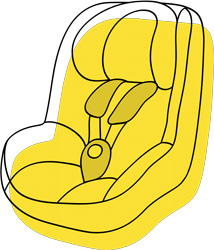
If you plan to drive a young child anywhere, you'll need to put them in a car seat. Here's a look at your options.
What are the different types of car seats?
As your child grows, they will need new car seats that can hold them safely.
Rear-facing seat. All infants and toddlers should ride in a rear-facing car seat until they reach the seat's size limits.
Convertible seat. These seats convert from rear-facing to forward-facing. This type of seat may last longer than a rear-facing seat.
Combination seat. These seats are used by toddlers, preschoolers and school-aged children. They can be used forward-facing with a harness for children who weigh from 40 to 65 pounds. For children who are 100 to 120 pounds, the seat can be used as a booster without the harness.
Belt-positioning booster seat. Booster seats are for children who have outgrown their forward-facing car seats. A belt-positioning booster seat should be used until the vehicle seat belt fits properly. Your child should use this seat until they can sit on the vehicle's seat with the shoulder belt across their shoulder (instead of against their neck). Many children will need to use a car seat until they are 10 to 12 years old.
How do you install a car seat properly?
Car seats can be securely installed with either the vehicle seat belt or the vehicle car seat attachment system, also known as LATCH. Both methods are equally safe.
The LATCH system has lower anchors, located in the back of the seat between seat cushions. The top tether anchor is usually located behind the seat. All forward-facing car seats have tethers that connect to these anchors. It is important to always read the vehicle owner's manual and the car seat manual before installation.
Source: American Academy of Pediatrics